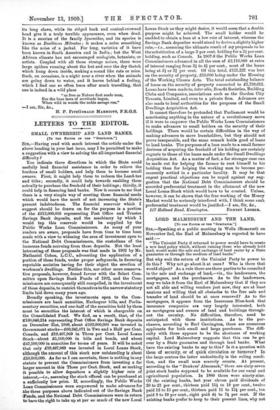LETTERS TO THE EDITOR.
SMALL OWNERSHIP AND LAND BANKS.
[To THE EDITOR OF THY " SPECTATOR."'
Siu,—Having read with much interest the article under the above heading in your last issue, may I be permitted to make a suggestion with a view to solving the all-important financial difficulty P You indicate three directions in which the State could usefully lend financial assistance in order to relieve the burdens of small holders, and help them to become small owners. First, it might help them to redeem the Land-tax and tithe ; secondly, it could help towards enabling them actually to purchase the freehold of their holdings ; thirdly, it could help in financing land banks. Now it occurs to me that there is a very simple way of meeting these financial needs which would have the merit of not increasing the State's present indebtedness. The financial reservoir which I suggest should be drawn on for the purpose is a portion of the 2212,000,000 representing Post Office and Trustee Savings Bank deposits, and the machinery by which I would tap this reservoir would be supplied by the Public Works Loan Commissioners. As many of your readers are aware, proposals have from time to time been made with a view to widening the area of investment open to the National Debt Commissioners, the custodians of the immense funds accruing from these deposits. Not the least interesting of these proposals was that made in 1902 by Mr. Nathaniel Cohen, L.C.C., advocating the application of a portion of these funds, under proper safeguards, in financing reputable societies having for their object the erection of -workmen's dwellings. Neither this, nor other more conserva- tive proposals, however, found favour with the Select Com- mittee upon Savings Bank Funds of 1902, and the Com- missioners are consequently still compelled, in the investment of these deposits, to restrict themselves to the narrow statutory limits laid down many years ago.
Broadly speaking, the investments open to the Com- missioners are bank annuities, Exchequer bills, and Parlia- mentary securities, and one-half of the securities held by them must be securities the interest of which is chargeable on the Consolidated Fund. We find, as a result, that, of the £160,648,214 representing Post Office Savings Bank deposits on December 31st, 1908, about £103,000,000 was invested in Government stocks-260,241,071 in Two and a Half per Cent. Consols, and £19,497,969 in Three per Cent. Local Loans Stock—about £5,500,000 in bills and bonds, and about £47,500,000 in annuities for terms of years. It will be noted that only £19,497,969 was invested in Local Loans Stock, although the amount of this stock now outstanding is about £50,000,000. As far as I can ascertain, there is nothing in any statute to prevent the Commissioners from investing a far larger amount in this Three per Cent. Stock, and so making it possible to allow depositors a slightly higher rate of interest,—i.e., assuming the stock offered can be purchased at a sufficiently low price. If, accordingly, the Public Works Loan Commissioners were empowered to make advances for the three purposes above indicated out of the Savings Bank 'Funds, and the National Debt Commissioners were in return to have the right to take up at par so much of the new Local
Loans Stock as they might desire, it would seem that a double purpose might be achieved. The small holder would be enabled to obtain a loan at a low rate of interest, whereas the Savings Bank depositor would stand to derive a slightly higher rate,—i.e., assuming the ultimate result of my proposals to be the substitution of a large 3 per cent. holding for a 21 per cent. bolding, such as Consols. In 1907-8 the Public Works Loan Commissioners advanced in all the sum of L2,116,060 at rates of interest ranging from 3} to 4} per cent., most of the loans being at 31 or 31 per cent. Of this total, £121,222 was lent on the security of property, £58,000 being under the Housing of the Working Classes Acts. The total outstanding balance of loans on the security of property amounted to £1,759,612. Loans have been made to, inter alia, Benefit Societies, Building Clubs and Companies, associations such as the Garden City Tenants, Limited, and even to a private firm. Advances are also made to local authorities for the purposes of the Small Dwellings Acquisition Act.
It cannot therefore be pretended that Parliament would be sanctioning anything in the nature of a revolutionary move if it were to empower the Public Works Loan Commissioners to make advances to small holders on the security of their holdings. There would be certain difficulties in the way of making advances to mere leaseholders, but they should not prove insuperable, and the same remark holds good of loans to land banks. The purposes of a loan made to a small farmer desirous of acquiring the freehold of his holding are certainly cognate to those of the loans made under the Small Dwellings Acquisition Act. As a matter of fact, a far stronger case can be made out for helping the farmer to root himself to his holding than for helping the working man to become per- manently settled in a particular locality. It may be that cogent practical objections can be urged against my sug- gestion that the National Debt Commissioners should be accorded preferential treatment in the allotment of the new Local Loans Stock which would have to be created. Unless, however, it can be shown that the free working of the Money Market would be seriously interfered with, I think some such preferential treatment would be justified.—I am, Sir, &c.,
117 Holland Road, Kensington. ERNEST LESSER.














































 Previous page
Previous page